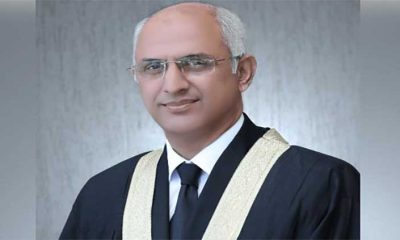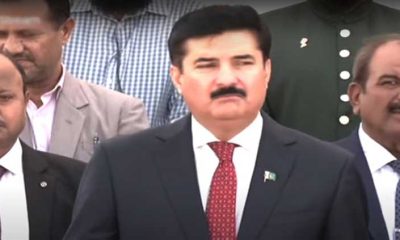The issue of allocation of funds for holding elections in Punjab and Khyber Pakhtunkhwa became more complicated on Monday as the Standing Committee of the National Assembly sent it back to the parliament.
This was announced by Minister of State for Finance and Revenue Dr Aisha Ghaus Pasha after the meeting of the Standing Committee on Finance.
She said that neither the SBP nor the Finance Divison has the authority to allocate funds from the Federal Consolidated Fund.
She said that the allocation of funds required approval from the parliament. “Without the approval of the parliament, no bill or budget has any legal authenticity.
“Hence, we leave the matter up to the parliament now. The parliament is supreme for us because this is what is written in the Constitution.”
Regarding today meeting, she explained that the SBP can only allocate the money but cannot release it.
The Finance Division can only act on the orders of the federal cabinet. It is up to the cabinet to take the matter to the parliament … if the parliament approves, the funds will be disbursed today, she added.
Standing Committee meeting
Earlier, SBP Acting Governor Sima Kamil on Monday, while briefing the National Assembly’s Standing Committee on Finance, said the State Bank of (SBP) has allocated Rs21 billion for elections in the Punjab and Khyber Pakhtunkhwa as directed by the Supreme Court but it has no authority to release the amount.
This Standing Committee met to review the latest situation as the deadline set by the apex court expires today.
The meeting was held with committee Chairman Qaiser Ahmed Sheikh in the chair and attended by Law Minister Senator Azam Nazir Tarar, Trade Minister Syed Naveed Qamar, Attorney General Mansoor Usman Awan, Dr. Ramesh Kumar, Ali Pervaiz Malik, Barjees Tahir and others.
Law Minister Tarar said that every penny from the FCF is spent on the directive of the federal government.
Funds for elections were not allocated in the annual budget. The finance ministry tabled a bill titled “Charged Sum for General Election (Provincial Assemblies of Punjab & Khyber Pakhtunkhwa) Bill 2023. But both houses of parliament rejected the bill, he added.
About apex court’s April 17 order, he said that the matter of the approval of funds should be reviewed first and asserted that the “Constitution precedes all”.
He said that if more funds were needed, the federal government could offer supplementary grants.
Instead of confrontation, a solution should be found,” Tarar added.
Meanwhile, PML-N’s Barjees Tahir said elections in Punjab would harm the country.
He recalled that even in its previous session, the standing committee had decided against releasing funds to the ECP.
He questioned how the apex court could issue an order to the SBP. “Does the national treasury belong to the state bank’s governor?”
AGP Awan said institutions have to ensure the implementation of the decision of the Supreme Court. The National Assembly has the prerogative to approve or reject these funds.
Commerce Minister Qamar said that institutions were being threatened with contempt of court.
“I disagree with the law minister and the attorney general,” Qamar told the committee while noting that the budget approval was the NA’s authority.
“The Supreme Court is saying that the authority to allocate the budget should be given to us. The National Assembly cannot give this authority to any institution,” he noted.
Supreme Court order
A three-member bench, comprising Chief Justice of Pakistan (CJP) Umar Ata Bandial, Justice Ijazul Ahsan and Justice Munib Akhtar had directed the government on April 4 to provide Rs21 billion to the ECP for elections by April 10 and instructed the ECP to submit a report in this regard on April 11.
However, the government referred the matter to the parliament which refused to comply with court order.
The court summoned finance secretary, SBP governor, Attorney General for Pakistan (AGP) Mansoor Awan and the ECP on April 14. It also directed the SBP to submit the record and details of all monies whatsoever of the federal government lying with or under the control, custody or management of the bank.
After the in-chamber hearing, the court ordered the SBP to release funds from the FCF for elections.
Post Views: 146


 Sports3 months ago
Sports3 months ago
 Fashion2 months ago
Fashion2 months ago
 Sports3 months ago
Sports3 months ago
 pakistan3 months ago
pakistan3 months ago
 pakistan3 months ago
pakistan3 months ago
 World2 months ago
World2 months ago
 World2 months ago
World2 months ago
 Sports2 months ago
Sports2 months ago






















